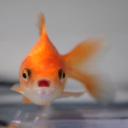Yahoo Answers is shutting down on May 4th, 2021 (Eastern Time) and beginning April 20th, 2021 (Eastern Time) the Yahoo Answers website will be in read-only mode. There will be no changes to other Yahoo properties or services, or your Yahoo account. You can find more information about the Yahoo Answers shutdown and how to download your data on this help page.
Trending News
Using reverse osmosis water in aquarium?
Have been raising fish off and on for 50 years and only have used well water and city tap water. I have come to the conclusion that city tap is a pain in the butt. The PH is like 8.6+. So I decided to use reverse osmosis four staged water. Everything is taken out of it. So is there something I should know about the electrolytes and minerals needed for freshwater fish? I only started to use it when doing my water changes, so is it necessary to add something different? Second question: If setting up a new aquarium with RO water, is it necessary to cycle? There is no chlorine, ammonia, nitrates or nitrites in it. And again what do you add to it? I can't find it on the net anywhere.....
10 Answers
- Anonymous9 years agoFavorite Answer
Yes your tap water does seem a bit high ph and probably hardness. Enough to give you issues with many fish and plants anyway.
Using PURE R/O water however is not a good idea, it has zero hardness, no buffering to keep the pH stable, and no trace elements. Using that will create a whole different set of problems.
What I suggest you do is mix "some" of your hard tap water into the R/O water, to give you a sensible pH and hardness, and use that. You will need to experiment on the ratio, but if your tap water is that hard maybe you will only need 10 or 20% tap water mixed into the R/O to get sensible water parameters for most fish.
Ian
- Anonymous6 years ago
This Site Might Help You.
RE:
Using reverse osmosis water in aquarium?
Have been raising fish off and on for 50 years and only have used well water and city tap water. I have come to the conclusion that city tap is a pain in the butt. The PH is like 8.6+. So I decided to use reverse osmosis four staged water. Everything is taken out of it. So is there something I...
Source(s): reverse osmosis water aquarium: https://tr.im/16RM1 - Anonymous5 years ago
First off, R/O water is not mineral water, it's the opposite, its Non-mineral water. The R/O filter removes most of the pollutants and minerals from the water, thats the idea of using one. That leaves the water practically pure, but it has no hardness or pH buffering, and no trace elements. So if you want to use it for your tank you should add some buffering (a product called RO Right for example). This restores the correct level of hardness and trace elements to the water. If you are using an R/O unit because your tap water is very hard, but otherwise clean then you can just mix a bit of normal conditioned tap water back into the RO water to get the hardness and PH back to normal levels. Maybe 10-20%? Using R/O for a pond is probably going to be overkill, and it depends on the quality of your tap water as to wether you need it at all. If your tap water is clean and reasonable hardness, then it's perfectly OK for fish as is. Ian
- How do you think about the answers? You can sign in to vote the answer.
- TantrixLv 59 years ago
First of all most modern day fish breeders use city water which can typically range from 7.5 to 8.5. The fact that some people use RO water can actually stress the fish because they were bread in higher PH water. Ask your local fish store to test the ph in their tanks...I suspect they will generally be around 8.0. That being said I would stick with city water and use tap water conditioner. Even in the wild; most rivers, streams lakes etc are alkali.
Another CON of using RO water is the need to add trace elements to your water - like calcium, magnesium etc. This can (and will) likely be more if a pain than using city water and conditioner.
It is ALWAYS necessary to cycle a new tank. The idea of cycling a tank is to produce ammonia, nitrates and nitrites so that the beneficial bacteria that feed on these harmful chemicals can propagate and live in the biological filter media in your filter system. Once that is done then the fish by products (fish feces) that will inevitable end up in the tank will be quickly neutralized by the beneficial bacteria made during the process of cycling.
Good luck to you.
Source(s): 20+ years of healthy and happy fish. - reignofcheeseLv 69 years ago
It is vital that you reintroduce the vital minerals to the water necessary for buffering (stability) and fish health.
These products are available at any fish store, the most common brand is Kent. it will need to be added to any new water changed as well as when first setting up a tank.
Cycling is the establishment of bacteria and necessary no matter what water is used. Those who already have an aquarium running need not go through the hassle of a fishless cycle for additional tanks - they can move some filter media from the existing filter into the new filter, thus transferring living bacteria from one tank to another, and immediately add the first batch of fish. i've been doing this for years and it works like a charm.
- MelanieLv 45 years ago
For the best answers, search on this site https://shorturl.im/awgQu
Yes you can use RO water to do some water changes with. If your tanks already have tap water in them then there really is no need to add any thing other than some alkalinity buffer, and thats only a maybe.
- theChadLv 69 years ago
All trace elements are removed in the RO process. These could be added by using fertilizers. Planted tank fertilizers.
http://www.liveaquaria.com/product/refinement_defi...
Hobbiest use these to put back the elements pulled from the water by plants.
Care would have to be taken in this case as hobbits would with a planted tank. To many or to much can harm fish just as not enough would be caused by the RO process.
Living in the NW i only have soft neutral water. I only have read about fighting with high PH and hard water issues. However I know a bit about RO and replacing supplements.
The salt water hobbiest knows this even more. They are more apt to use RO water and supplements.
A lot of times they have their own LFS mix their waters for them for water changes just because of the complexities.
I've used powder trace elements as well. These are better than liquids purchased in a pet store. liquides usually have high phosphate. Which feeds algae.
I know there is on-line stores out there where you could find powder trace elements. But I buy mine from 1 store. They are much cheaper than the liquid formulas too.
I probably don't need to tell you the importance of these trace elements to all living things or you wouldn't be inquiring about it...
Cycling: Would be standard in this case. If your staring with a fresh set up you would have to restart the bio cycle. If your bio filtration is already exsisting all you would have to do is add the new water.
RO water is pure H2O. A need for a "conditioner" To remove chlorine wouldn't be needed.
- FishlessLv 69 years ago
You can't directly use RO water in aquarium without adding some kind of buffer first.
Or your PH can crash easily without buffer. Once nitrate build up, any water without some kind of buffer will have PH drop instantly.
There are quite a few products online to buy from for adding buffer to your desired level.
http://www.drsfostersmith.com/fish-supplies/freshw...
Cycle a fish tank has nothing to do with what kind of water you use. It is all for grow enough beneficial bacteria to covert ammonia to nitrite, then convert nitrite to nitrate.
For more information on why and how to cycle a tank
- Anonymous9 years ago
1. I would not use all RO water, I'd mix some tap or else you will have to buy a buffer for putting back some minerals etc. in the water
2. cycling has nothing to do with which water you use.
cycling is the process that initially establishes beneficial bacteria in your filter which reduce the waste products from rotting fish food, fish waste etc. and has nothing to do with any ammonia or nitrogen compounds that might be in some tap water.




